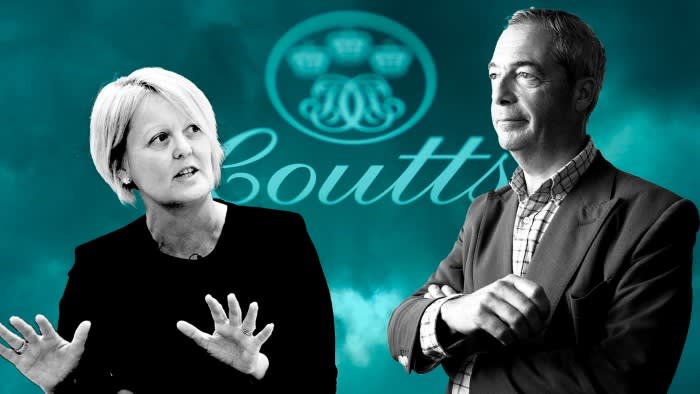Unlock the Editor’s Digest for free
Roula Khalaf, Editor of the FT, selects her favourite stories in this weekly newsletter.
NatWest shares plunged by the most since the Brexit vote after it cut its profit outlook for the year, adding to the bank’s problems on the day it published a highly anticipated report into its treatment of Nigel Farage.
The UK lender on Friday published a report by law firm Travers Smith, which found that while the decision to cut off Farage as a client was primarily commercial and therefore lawful and in line with its policies, it failed to communicate the decision properly and then mishandled his complaint.
“Coutts failed to pay due regard to the interests of Mr Farage and failed to treat him fairly in the round,” the report concluded. Travers Smith said it reviewed 3.7mn documents and interviewed 28 staff involved.
The findings of the investigation were released alongside NatWest’s third-quarter earnings, which revealed pre-tax profit of £1.3bn that missed analysts’ expectations. The bank also cut its guidance for lending margins in a signal that the benefits from higher interest rates had peaked.
“There is very little positive in this statement,” said Numis analyst Jonathan Pierce, referring to the bank’s results. “To say this is disappointing is an understatement.”
NatWest shares plunged almost 18 per cent in London in early trading, before recovering to trade down 10 per cent. That was still their worst daily fall since the day after the UK voted to leave the EU. NatWest is still 39 per cent owned by the government after its 2008 bailout.
The lawyers’ probe also determined that former chief executive Dame Alison Rose gave a BBC journalist confidential information about Farage, in a move that “probably” broke data protection laws and may also have breached regulatory rules. The Financial Conduct Authority separately announced its own probe into the matter.
The Financial Times reported on Thursday that the UK Information Commissioner’s Office had already found that Rose twice breached data protection laws.
“This report sets out a number of serious failings in the treatment of Mr Farage,” said NatWest chair Sir Howard Davies. “The findings set out clear shortcomings in how [the decision] was reached as well as failures in how we communicated with him and in relation to client confidentiality.”
“We apologise once again to Mr Farage for how he has been treated,” he added, promising “substantive changes” to the lender’s procedures.
The Farage scandal erupted in July when the former leader of the UK Independence and Brexit parties demanded the resignation of Rose after he claimed he was “debanked” from the prestigious wealth manager for his political views.
NatWest initially insisted the decision was purely commercial. However, Farage obtained internal documents from Coutts through a data subject access request, which showed its reputational risk committee had accused him of “pandering to racists” and being a “disingenuous grifter”. It concluded his politics were “at odds with our position as an inclusive organisation”.
Rose then compounded the issue by speaking to a BBC reporter about the scandal, misleading the organisation into writing a story that said Farage’s politics played no part in the process.
She stepped down later that month. Former Coutts chief executive Peter Flavel also left the bank.
“On balance, the exit decision was predominantly a commercial decision. Coutts considered its relationship with Mr Farage to be commercially unviable because it was significantly lossmaking,” Travers Smith said. However, it did find that “the risk Coutts perceived to its reputation in the eyes of its stakeholders” was a supporting consideration.
Rose said the report confirmed “everything I told the Board in July was correct.” She added: “Travers Smith also confirmed I knew nothing about the comments made by Coutts staff about Mr Farage, which were deeply unpleasant and unfair.”
Farage called the law firm’s investigation a “whitewash” on X, formerly Twitter, after it concluded his pro-Brexit stance was not a factor. “The word Brexit appeared no less than 86 times in my subject access request. What planet are they living on?”
NatWest said it would implement all recommendations made in the report, most notably ensuring that “the lawfully protected beliefs or opinions of customers do not play any role in exit, retention or onboarding decisions”.
It will also review its treatment of politically exposed persons, which are subject to enhanced scrutiny and often find it more difficult to access banking services as a result.
The board has not reached a decision on whether Rose will receive any of her pay for 2023 and said it would “disclose the relevant outcomes, as soon as possible”.
Before her departure, she would have been eligible for a maximum package of £5.3mn, including £2.4mn in salary and fixed share awards and up to £2.9mn in variable pay. She also holds 2.6mn unvested shares worth about £5.4mn.
